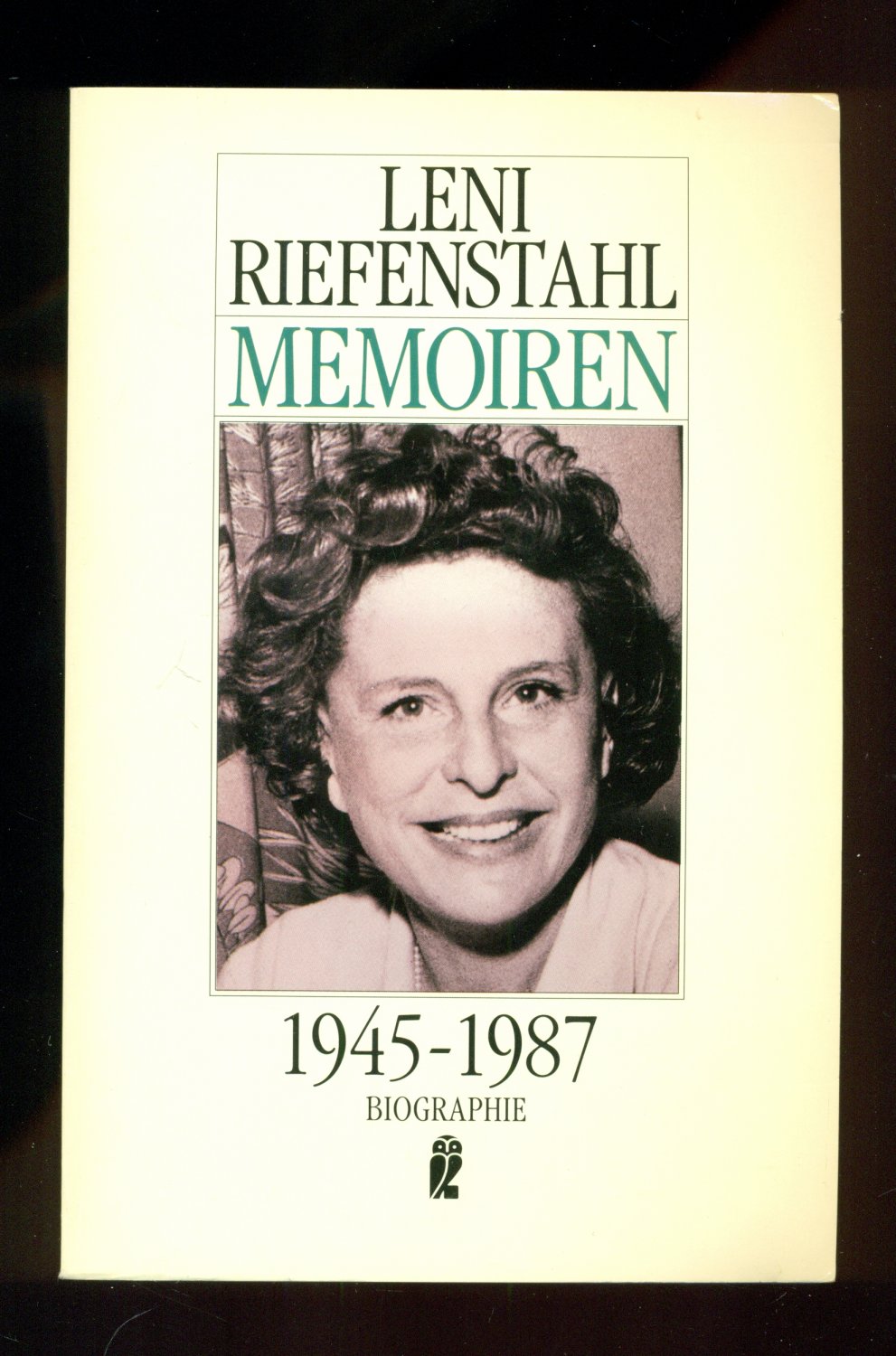Riefenstahl was best known for her documentary film Olympia (1938), on the 1936 Summer Olympics in Berlin and her Nazi propaganda films, Der Sieg des Glaubens (1933), Triumph of the Will (1935), and Tag der Freiheit (1935), which are regarded by historians as among the greatest propaganda films of all time. The United States release of this film, in 1993, coincided with the. Leni Riefenstahl Memoiren Paperback – January 1, 1991 by LAI NI LI FEN SHI TA ER (Author) See all formats and editions Hide other formats and editions. Price New from Used from Paperback, January 1, 1991 'Please retry' $39.99 — $39.99: Paperback $39.99 1 Used.

| The Wonderful, Horrible Life of Leni Riefenstahl | |
|---|---|
| Directed by | Ray Müller |
| Produced by |
|
| Written by | Ray Müller |
| Starring | Leni Riefenstahl |
| Music by | |
| Cinematography |
|
| Edited by | |
Production companies |
|
| Distributed by | Kino |
| |
| 188 minutes | |
| Country | Germany |
| Language | German |
| Box office | $449,707 (USA) |
The Wonderful, Horrible Life of Leni Riefenstahl (German: Die Macht der Bilder: Leni Riefenstahl) is a 1993 German documentary film about the life of German film director Leni Riefenstahl, directed by Ray Müller.
Production[edit]
Riefenstahl was best known for her documentary film Olympia (1938), on the 1936 Summer Olympics in Berlin and her Nazipropaganda films, Der Sieg des Glaubens (1933), Triumph of the Will (1935), and Tag der Freiheit (1935), which are regarded by historians as among the greatest propaganda films of all time.
The United States release of this film, in 1993, coincided with the publication of Riefenstahl's autobiography Leni Riefenstahl: A Memoir (New York, 1993), as well as with her ninetieth birthday. The two releases are not unrelated. The Wonderful, Horrible life of Leni Riefenstahl was born from an idea of Riefenstahl herself, who, motivated by her old age and already working on her memoirs, decided to commission a documentary about her life.
Concerned about being associated with the 'Nazi director', eighteen filmmakers declined the project, before Müller agreed to portray Riefenstahl in what ended up being a three-hour-long documentary (three times its contract length).
Leni Riefenstahl Memoir Pdf
The length of the film is therefore the result of a decision by the director: Müller justifies it as an attempt to give a fair representation of Riefenstahl's life, which cannot be reduced to the eight years she worked for the Nazi regime, but presents much more interesting stories and facts that are relevant to understand her personality. Showing more historical material about her life, according to Müller, also helps to compensate the strong image of herself that Riefenstahl tries to impose throughout the movie, giving the viewer a better chance to draw their own conclusions. The Wonderful, Horrible Life of Leni Riefenstahl encapsulates a historical figure at the end of her life. Through this film, it is shown how Riefenstahl dealt with the repercussions of her early work.
Reception[edit]
The film garnered a strong critical response. It currently has a 95% rating amongst critics cited on the Rotten Tomatoes film review website.[1]
'This movie is fascinating in so many different ways: As the story of an extraordinary life, as the reconstruction of the career of one of the greatest of film artists, as the record of an ideological debate, as a portrait of an amazing old woman.' Roger Ebert, Chicago Sun-Times[2]
'Consistently fascinating documentary... This very significant film is the fablelike story of a woman whose search for the ideal, not unlike Ms. Riefenstahl's search in a very different world, leads to disaster.' Vincent Canby, New York Times[3]
Release and awards[edit]
Belgian, British, and German production companies financed the film and it was distributed by American, Japanese, Canadian, and French companies. It premiered at the Toronto Festival of Festivals in September 1993, followed shortly thereafter at several American film festivals.
When broadcast in the United States, the film received a primetime slot of 8:00pm on stations like PBS. When televised in Germany and Austria, the film met opposition and wasn't aired until 11:00pm. It won an Emmy Award at the International Emmy Awards in 1993, for Arts Documentary. Ray Müller won the Golden Space Needle Award for best documentary at the Seattle International Film Festival in 1994. The film is consistently found on “best documentary” lists. In Germany, the Emmy win was rarely mentioned.
Leni Riefenstahl Memoiren
References[edit]
- Notes
- ^The Wonderful, Horrible Life of Leni Riefenstahl (1993) Rotten Tomatoes
- ^The Wonderful Horrible Life Of Leni Riefenstahl (review)Chicago Sun-Times. June 24, 1994
- ^Wonderful, Horrible Life of Leni Riefenstahl (review)New York Times. October 14, 1993
- Bibliography
- Starkman, Ruth. 'Mother of All Spectacles: Ray Muller's 'The Wonderful, Horrible Life of Leni Riefenstahl', Film Quarterly, Vol. 51, No. 2 (Winter, 1997-1998), pp. 21–31.
Leni Riefenstahl Memoiren Kritik
External links[edit]
- The Wonderful Horrible Life of Leni Riefenstahl at IMDb
